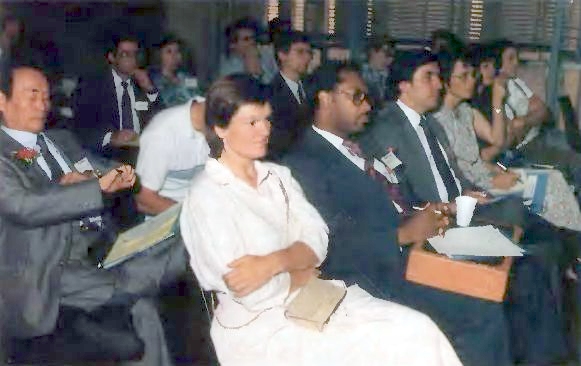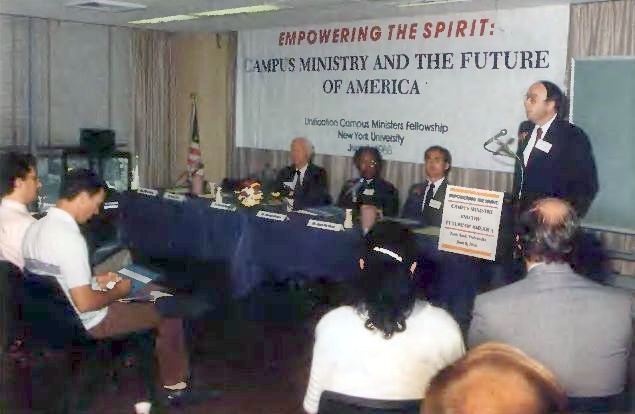![]()
The Words of the Schukers Family
|
|
The Words of the Schukers Family |

Divinity
graduates and guests attend the first conference of the Unification
Campus Ministers Fellowship on June 6, 1988.
Amy Cuhel Schuckers is a 1983 UTS Divinity graduate and is currently working as the UCMF coordinator under Dr. Durst and Dr. Seuk.
The two-day period of April 4-5, 1988, was a historic time for the three-year graduates of the Unification Theological Seminary. For the first time Father specifically called Divinity graduates along with other leaders to meet with him at East Garden just before his departure for Korea. Those who arrived early on April 4 had a special opportunity to play pool with him (reminiscent of the days at UTS). He had quite a string of challengers lined up, all of whom he beat soundly.
When he began speaking later in the day, his frank message reflected the hope and expectation he had for the graduates--those that he had taken off the front line to educate for the sake of the future victory--as well as his disappointment with the path we have been following. He showed throughout his speech how thoroughly he has been planning for the eventual time when Americans will lead other Americans. He also expressed how disappointed he was that we have been unable to thus far rise to the standard needed. At 2:00 am, when he finished his speech for the night, he asked us to seriously repent for our lack of seriousness.
His strong speech on the first night was tempered by his assurance the next morning that through his chastisement he had thwarted Satan's right to attack us. At the same time he brought everyone into a stronger unity. At the end of his speech he spoke particularly to the Divinity graduates and called them to the specific task of campus ministry in order to save the second generation of young people in America.
Dr. Mose Durst, president of the Unification Church of America, and Dr. Joon Ho Seuk, the national director of CARP, were asked to be the directors of this new joint project. Their task is to serve, lead, and guide the Divinity graduates in the fulfillment of this responsibility, and to coordinate with other departmental leaders in order to utilize the existing foundation of our movement in support of campus ministry.
In responding to Father's direction, Dr. Durst and Dr. Seuk met later in the day on April 5 to begin plans as to how to substantiate Father's vision. They established the Unification Campus Ministers Fellowship (UCMF), which would be a vehicle to connect the Divinity graduates with the other Unification campus ministers who have already been working through the CARP foundation.
All Divinity graduates who were unable to meet with Father on April 4-5 were invited to a meeting in New York on April 10. There, both Dr. Durst and Dr. Seuk shared Father's message and their hope for campus ministry. In addition, CARP members who had already established themselves as campus ministers shared some of their testimonies and experiences in getting established on their campuses.
A conference was planned immediately and was held on June 6 at New York University. The conference was designed as both an ecumenical activity for campus ministers of other denominations and an opportunity to nurture and orient the newly called Unification campus ministers. Entitled "Empowering the Spirit: Campus Ministry and the Future of America," the conference was well attended by about 70 people, who were addressed by a panel of impressive speakers.
In his welcoming remarks to the participants, Dr. Durst commented about the need for spiritual guidance for our young people who exist in a society vacant of values on every level. He referred to several current works-- specifically Allan Bloom's The Closing of the American Mind, Robert Bellah's Habits of the Heart, and Richard Neuhaus's The Naked Public Square -- that elucidate the tragedy of the lack of values in every area of our society.

Dr.
Mose Durst speaks on our young people's need for direction in a
society vacant of values.
Dr. Seuk, in his opening address, outlined the history of campus ministry. He spoke of the need for a new vision for campus ministry, which has lost sight of its original purpose, and he called for a unity among campus ministers that would transcend denominationalism, race, culture, and background in order to save young people in America and in the world.
The keynote address, entitled "Campus Ministry and the Future of America," was given by Dr. Ernest Gordon. Dr. Gordon was dean of the Chapel at Princeton University for 26 years and is the author of several books. He is also president of the Christian Rescue Effort for the Emancipation of Dissidents (CREED). Dean Gordon traced the history of the relationship between the university and the church up to the present time, noting that, as Kierkegaard expressed, culture or civilization "is the product or consequence of a creative tension between church and university." He reminded us that all of the academic institutions in this country grew out of the church, out of the church in its relationship with the university." The battle in today's society, then, is to "find ways of encouraging the university to form its moral authority once again, and it can only do so in relation to Christianity and its moral dynamic."
Dr. Joseph Paige, vice-president of Shaw Divinity School, followed with a talk on "The Role of the Seminary in the Education of Value." He stressed that "the challenge of the seminary is to produce graduates with competency to move and practice in the real world. We need people who can teach, who can preach, and who can pray." But "when it comes to the real world, we have a lot missing." We need to do less "God-talking" and more "God-walking."
A lunchtime address was given by Rev. James Bevel, executive director and co-founder of Students for Education and Economic Development (SEED). His topic concerned "The Campus Minister as the Campus Role Model." He called on those present to "stop working on being socially accepted," to "get over working on economic security," and to "go to the campuses and help somebody." The message to be preached is "the liberation of the people of the earth and the salvation of America."
After a lively panel discussion, in which the panelists and participants discussed the topic "Strategies for Overcoming Secularism in Academia," the final speaker of the day, Rev. Dr. Hilton White, professor of sociology and public administration and chaplain of Medgar Evers College, CUNY, spoke about "Linking the Campus and the Community: Harnessing Student Idealism in Community Service." Drawing upon his long experience as a campus minister and his expertise in administration, he outlined the dynamics of what he calls POLE: "Plan, Organize, Lead and Evaluate." He stressed that campus ministers can't just work on some hunch. In order for "campus ministry to be meaningful for the students and to have them relate to the environment, then you need to do some planning," because "success only comes when you plan with deliberateness."
One of the biggest challenges that the three-year Divinity graduates face is that Father gave them the responsibility of working on the university as a campus minister in addition to whatever other mission they already have. Divinity graduates are working throughout the Unification movement as regional coordinators, state leaders, city leaders, CARP leaders, and Ocean Church leaders. They are at CAUSA, UTS, IRF, ICC, IRFF, ICUSA, and ISC. Some are also working at The World and I magazine, in business, and in home church. These are all missions that already require a full-time investment. Yet Father, knowing that, called them to take on even greater responsibility.
The future is in our hands. Campus ministers have the special opportunity to guide, lead, and raise up a generation of young people who will be the future leaders of our nation and world. Not only here, but in Korea as well, the university community and campus ministers influence all of society.
Through campus ministry, then, not only can students be influenced but other campus ministers, as well as university presidents, administrators, and professors, can be supported and strengthened in their mission of educating the next generation. The university can ultimately be called to fulfill its central role as the heart, mind, and future hope of society.